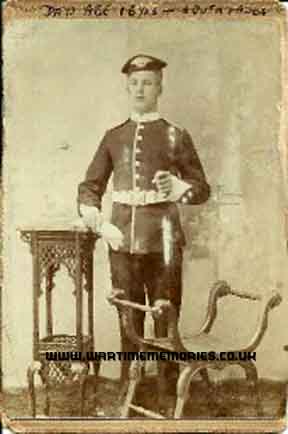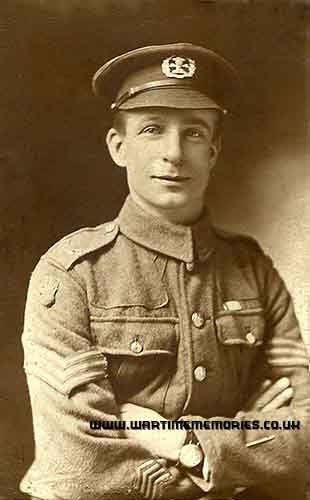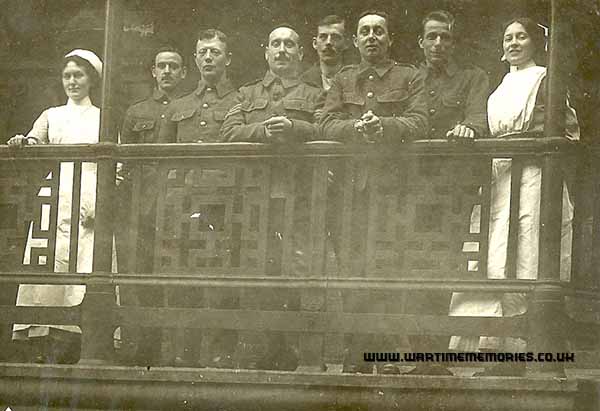Additions will be checked before being published on the website and where possible will be forwarded to the person who submitted the original entries. Your contact details will not be forwarded, but they can send a reply via this messaging system.
please scroll down to send a message
Sgt. David James Game
British Army 6th Btn. South Lancashire Regiment
from:Bedford St. Leamington Spa
Sgt. David James Game served with the 1st Battalion South Lancs 1904-1913 [7yrs India], 2nd Battalion South Lancs BEF 1914 [Battle of Mons] and 6th Battalion South Lancs BEF 1915-1919 Gallipoli and Mesopatamia
My grandfather was born 23rd August 1888 in Cambridge, he was one of 9 children, his parents moved to Leamington around 1899, and they lived in Bedford Street. Grandad enlisted with the 1st Battalion South Lancs in 1904 aged 15 years old, he was under age, on his service record he put his DOB as 1886, he served 9 years, 7 of them in India, he left in 1913 to join his brothers in Canada. Unfortunately war broke out and Grandad was back to the UK, he was now with the 2nd Battalion South Lancs as the 1st Battalion served the war in India.
Being in the regular army he was with the BEF [British Expeditionary Force] who were sent out to France whilst the New Army was being trained. I am able to piece together my grandfather’s experiences from himself, his service records and the War Diaries. Having served in France between 5 August and 22 November 1914, Grandad was truly "An Old Contemptible". He was also entitled to wear the clasp & rose to his 1914 Star Medal, awarded to all those who served under fire with the original British Expeditionary Force. By European standards the peacetime British Army was very small, but what it lacked in numbers it made up for in quality. Its Regular soldiers were long-time service professionals, confident in their marksmanship and discipline, and intensely proud of their Regiments. In comparison with the largely conscript continental armies, the British Expeditionary Force (BEF) of 1914 was indeed ‘a rapier among scythes’
Grandad took part in, the battles of Aisne and La Bassee, From 12th to 29th October 2nd South Lancashires experienced severe fighting and heavy casualties at the Battle of La Bassée, on the 21st October under cover of the mist, the Germans penetrated the front of the South Lancashires, on this day alone they lost seven officers and over two hundred men , but despite determined German attacks the battered line never broke.
First Battle Ypres: 2nd South Lancashires joined the 1st Loyal North Lancashires in the Ypres fighting, withstanding repeated attacks at Nonne Boschen 11th-13th Nov. The battle swayed back and forth as fresh German divisions were committed and, with ever decreasing numbers, the British Regular Army fought almost literally to the death, constantly attacking , withdrawing and counter attacking. The line held but at a terrible cost, both battalions being reduced to barely company strength. "Although names are given to periods of fighting, it is not possible to describe them as battles. It was a period of continuous, prolonged, ruthless encounter hardly interrupted at night. Our troops had no rest. They were out-numbered, out-gunned and opposed by a determined, skilful and implacable enemy. The fighting was largely individual. The casualties were so heavy that units lost their identity and were roughly grouped under brigades. The troops fought in shallow trenches and shell holes, and in terrible weather conditions. In addition to wound and death casualties, they suffered from frozen feet and knees and from rheumatism. Repulse of German attacks was a daily commonplace. Hourly shelling, to which no reply was possible, owing to shortage of ammunition. Only at night could supplies be brought up and wounded removed. As soon as dusk fell, Ypres was crowded with vehicles passing in and out...
It was at Nonne Boschen on the 13th Nov my granddad was wounded, he was returned home to England. In July 1915 he was with the BEF attached to the 6th Battalion South Lancs on his way to Gallipoli, they sailed from Avonmouth in June 1915, landed at Cape Helles (Gallipoli) 7-31 July, then moved to Mudros. Landed at Anzac Beach 4 August 1915. They were in action in The Battle of Sari Bair, The Battle of Russell's Top and The Battle of Hill 60, at ANZAC. It was here in Gallipoli he was promoted to Sergeant. They were evacuated from Gallipoli and went to Egypt via Mudros.
February 1916 he was on his way to Mesopotamia, the 6th Battalions of the East Lancashires, South Lancashires and Loyal North Lancashires, veterans of Gallipoli, were sent to Mesopotamia (modern Iraq) . They landed at Basra in March 1916. They formed part of the 38th (Lancashire) Infantry Brigade of the 13th (Western) Division of Kitchener’s New Army Here they had to acclimatize into the extreme weather conditions. Even so, with temperatures regularly exceeding 50 deg.C, death and illness from heat-stroke were common and dysentery, malaria and other tropical diseases were endemic. Grandad was used to the high temperatures, from his time spent in India, he partook in the battles here, and he finally returned home in March 1919. He was so very lucky to have survived all this, to come home, due probably to his expert pre war training.
He married Ellen Donald in 1920. On his return home from the Great War to a home fit for heroes, he found 2 1/2 days a fortnight work, digging trenches" for pipes. In 1923 - 1926 he joined the East Lancs as a private. Re-enlistment was encouraged by the short-term offer of a considerable financial incentive, this enabled my grandparents to eventually buy their home in Coventry. I believe he was truly a remarkable man.


